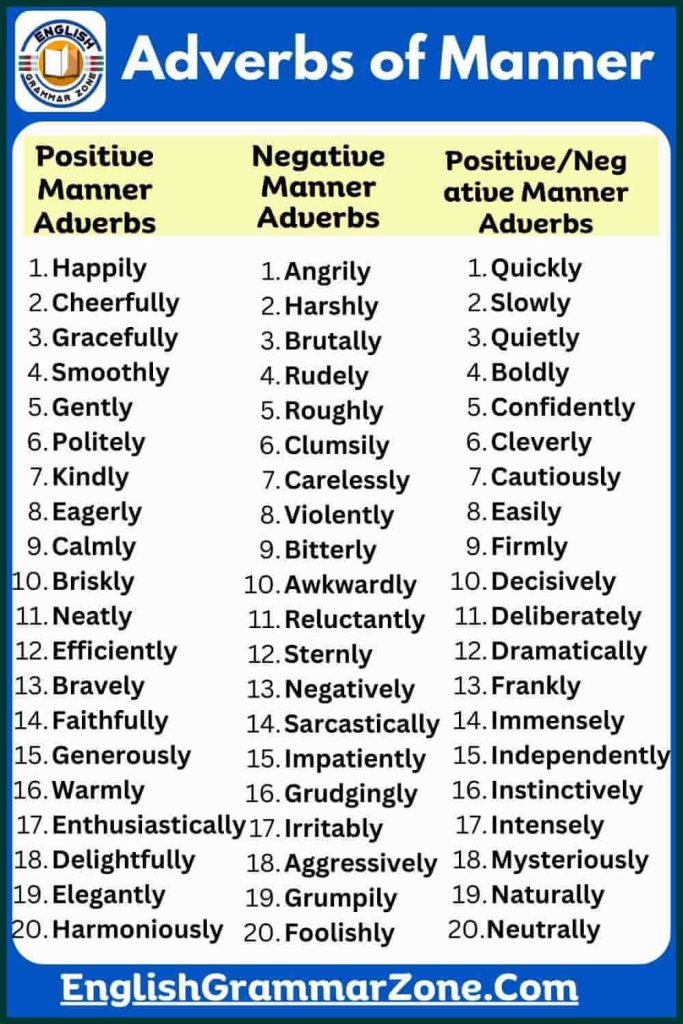In the world of grammar, understanding how words modify each other is key to improving your communication skills. One essential part of speech that plays a significant role in this is adverbs of manner. These adverbs describe how an action is performed, providing more detail to a sentence. Whether you’re explaining how a task was completed or how someone behaved in a situation, adverb of manner help convey your message clearly and vividly. For example, in the sentence “She sings beautifully,” the word “beautifully” tells us how she sings. In this article, we will dive into what adverbs of manner are, how they are used, and explore some examples that will help you use them effectively in your everyday conversations and writing.
Positive and negative manner examples

Adverbs of manner
Positive Manner Adverbs
- Happily
- Cheerfully
- Gracefully
- Smoothly
- Gently
- Politely
- Kindly
- Eagerly
- Calmly
- Briskly
- Neatly
- Efficiently
- Bravely
- Faithfully
- Generously
- Warmly
- Enthusiastically
- Delightfully
- Elegantly
- Harmoniously
- Joyfully
- Quickly
- Softly
- Lovingly
- Patiently
- Sincerely
- Optimistically
- Vividly
- Confidently
- Fervently
- Passionately
- Resiliently
- Heroically
- Vigorously
- Zestfully
- Adroitly
- Affectionately
- Artfully
- Amazingly
- Compassionately
- Considerately
- Devotedly
- Energetically
- Excitedly
- Playfully
- Productively
- Radiantly
- Tactfully
- Tenderly
- Vibrantly
Negative Manner Adverbs
.
- Angrily
- Harshly
- Brutally
- Rudely
- Roughly
- Clumsily
- Carelessly
- Violently
- Bitterly
- Awkwardly
- Reluctantly
- Sternly
- Negatively
- Sarcastically
- Impatiently
- Grudgingly
- Irritably
- Aggressively
- Disrespectfully
- Foolishly
- Grumpily
- Hastily
- Hatefully
- Indifferently
- Insensitively
- Jerkily
- Maliciously
- Menacingly
- Morosely
- Nastily
- Nervously
- Obnoxiously
- Pessimistically
- Presumptuously
- Recklessly
- Regretfully
- Selfishly
- Sullenly
- Suspiciously
- Tactlessly
- Terribly
- Thoughtlessly
- Unkindly
- Unwisely
- Vengefully
- Vindictively
- Wearily
- Wickedly
- Wildly
- Wrongly
Positive/Negative Manner Adverbs
- Quickly
- Slowly
- Quietly
- Boldly
- Confidently
- Cleverly
- Cautiously
- Easily
- Firmly
- Decisively
- Deliberately
- Dramatically
- Frankly
- Immensely
- Independently
- Instinctively
- Intensely
- Mysteriously
- Naturally
- Neutrally
- Openly
- Plainly
- Purposefully
- Quietly
- Rapidly
- Reluctantly
- Resolutely
- Secretly
- Sharply
- Silently
- Smoothly
- Solemnly
- Steadily
- Strategically
- Strictly
- Strongly
- Swiftly
- Tightly
- Unexpectedly
- Urgently
- Vastly
- Visibly
- Vividly
- Watchfully
- Wildly
- Wisely
- Wonderfully
- Zealously
- Curiously
- Faintly
Positive and negative manner examples

Frequently Asked Questions
What Are Adverbs of Manner?
Adverbs of manner are words that modify verbs, adjectives, or other adverbs to explain how an action is carried out. They give more detail about the way an action occurs. These adverbs answer the question “How?” For instance, in the sentence “He ran quickly,” the word “quickly” tells us how he ran.
How Do Adverbs of Manner Work in Sentences?
Adverbs of manner are placed after the main verb or after the object when one is present. They describe the action in greater detail. For example:
- “She laughed loudly.” (The adverb “loudly” tells us how she laughed.)
- “He plays the guitar skillfully.” (Here, “skillfully” describes how he plays the guitar.)
Can Adverb of Manner Modify Adjectives?
Yes, adverb of manner can also modify adjectives. This helps to enhance or intensify the quality described by the adjective. For example:
- “She is extremely talented.” (The adverb “extremely” intensifies the adjective “talented.”)
- “The cake is incredibly delicious.” (Here, “incredibly” emphasizes how delicious the cake is.)
Are There Any Common Adverbs of Manner?
Some of the most common adverbs of manner include:
- Quickly: She ran quickly.
- Carefully: He drove carefully.
- Easily: The test was easily completed.
- Happily: They lived happily ever after.
- Loudly: The children played loudly.
- Slowly: She walked slowly to enjoy the view.
These are just a few examples, but there are many adverbs of manner that can be used to describe actions in various ways.
How Can I Identify Adverbs of Manner?
To identify adverbs of manner, look for words that explain how something is done. They often end in “-ly,” but not always. For example, “fast” is an adverb of manner, though it doesn’t have the “-ly” suffix. Additionally, words like “well,” “hard,” and “straight” are also adverbs of manner because they describe how actions are performed.
Do All Adverbs End in -ly?
Not all adverbs of manner end in “-ly.” While many adverbs that describe how an action is done do end in “-ly” (such as “happily,” “quickly,” “easily”), some do not. Examples include:
- Fast: She runs fast.
- Hard: He works hard.
- Straight: She looked straight ahead.
Can Adverbs of Manner Be Used with Other Adverbs?
Yes, adverbs of manner can be used alongside other adverbs to give more detailed information. For example:
- “She sings very beautifully.” (Here, “very” intensifies “beautifully.”)
- “He drove quite recklessly.” (The adverb “quite” emphasizes “recklessly.”)

